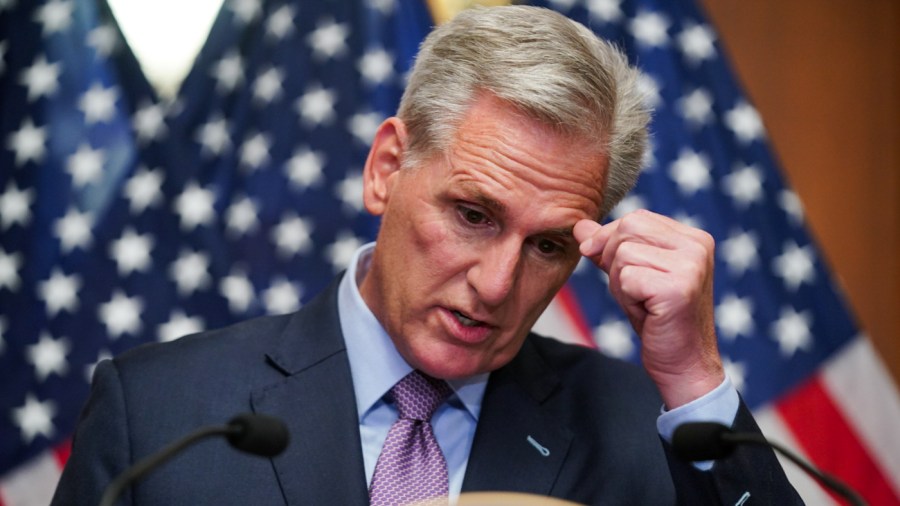Just In News | The Hill
In the toppling of former Speaker Kevin McCarthy, the hot-take is to lavish praise or scorn on Rep. Matt Gaetz (R-Fla.) or the “rabble-rousers” from his flank of the Republican Party. But the next Speaker, whoever it is, would do well to study what McCarthy did to bring about his downfall.
McCarthy’s central leadership failure was to go back on a key promise. He acquiesced in the status quo process for federal budgeting, by which shutdown crises are routinely created and then used to justify a rushed adoption of whatever growing levels of spending so-called “experts” demand, in addition to whatever shady deals the leadership is willing to cut.
In early August, already very late in the game, McCarthy pledged to members that he would work through the entire month to put together the 12 appropriations bills legally prescribed by the Congressional Budget Act of 1974. Little was actually completed. At no point did McCarthy use his power as Speaker to spur appropriators to action.
Instead, operating in its usual last-minute-crisis mode, McCarthy’s House belatedly took action on a handful of bills in the final week before the fiscal year was to end. This resulted in the usual annual appropriations trainwreck.
When McCarthy was elected Speaker in January, the new Republican Congress gave clear indications of what was expected in terms of regular order and completing appropriations bills on time. Certainly, conservatives hoped for a return to pre-COVID spending levels, but everyone knew that compromises would have to be made in a divided Congress.
McCarthy would have been given more leeway had he made a serious effort to challenge Congress’s dysfunctional status quo on appropriations by debating and passing spending bills one-by-one.
Absent real leadership, the status quo has prevailed again. Americans rightly connect this status quo with the pain of wages not keeping up with inflation. Most Americans cannot explain monetary concepts such as M2 or articulate the consequences of the Federal Reserve’s purchases of $5 trillion in Treasury debt to finance the nation’s deficit spending, but families feel the effects every week at the grocery store or when they apply for mortgages at usurious interest rates. They understand that it all relates back to the status quo of federal fiscal mismanagement.
Today, the national debt exceeds $33 trillion, more than the entire annual U.S. economy. The Congressional Budget Office (CBO) projects that the debt will exceed $50 trillion by 2033. Between 1970 and 2053, the U.S. will have had a balanced budget only for fiscal year 1998 through 2001 (following the 1997 tax cut), with the annual deficits worsening throughout the CBO’s Long Term Budget Outlook.
Over the next decade, the amount we pay on interest to service the debt ($10.6 trillion) will exceed both discretionary defense spending ($9.4 trillion) and total discretionary spending for the rest of government, from Agriculture to Veterans Affairs ($10.1 trillion).
By 2033, Congress will no longer even control its own deficit. At that point, even if it eliminates all discretionary appropriations overnight, the federal government will still run a half-trillion dollar deficit.
Compounding the problem is the fact that federal tax and revenue collections (18.35 percent of GDP) remain above the 60-year average for revenue collection (17.37-percent of GDP). This means that the current income tax structure leaves very little room to squeeze additional revenue out of anyone, even from the wealthy.
Substantial discretionary and programmatic reforms are needed to ensure our national security, continue programs like Social Security for those who need them and preserve our relatively prosperous way of life. This will require statesmanship of a high order — leadership that McCarthy was unable to deliver.
House conservatives do not expect a miracle. In a divided Congress with a razor-thin House majority, they do not expect a rewrite of the budgeting process, nor perfect reforms in monetary policy, K-12 education, immigration and other vital areas. But they did expect at least some effort to avoid the end-of-year train-wreck we just saw.
After the cleanup of the fiscal 2024 appropriations mess, there will be a real opportunity to learn from McCarthy’s mistakes. Real leadership in this area could turn the next Republican Speaker into one of this century’s great statesmen.
Doug Branch is principal at Phronesis Insights, LLC. For 25 years, he served in a variety of roles on Capitol Hill, including senior advisor for the Senate Homeland Security and Governmental Affairs Committee, deputy chief of staff to Rep. Warren Davidson (R-Ohio) and deputy staff director for the Joint Economic Committee.
Finance, Opinion, appropriations, Kevin McCarthy, U.S. Capitol Read More
Author Profile
Latest entries
 HeadlinesOctober 18, 2024Missing Texas real estate agent’s husband kept in jail with high bond as family rips his lack of cooperation
HeadlinesOctober 18, 2024Missing Texas real estate agent’s husband kept in jail with high bond as family rips his lack of cooperation ScienceOctober 18, 2024Spider-Man inspires sticky web-slinging tech
ScienceOctober 18, 2024Spider-Man inspires sticky web-slinging tech HeadlinesOctober 18, 2024Maxim makes an endorsement for the 2024 presidential election: 'You just lost zero fans'
HeadlinesOctober 18, 2024Maxim makes an endorsement for the 2024 presidential election: 'You just lost zero fans' HeadlinesOctober 18, 2024Hamas terror leader Yahya Sinwar killed in Gaza, Israel says
HeadlinesOctober 18, 2024Hamas terror leader Yahya Sinwar killed in Gaza, Israel says

